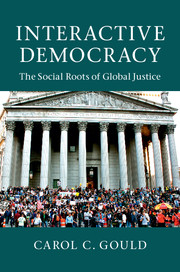Book contents
- Frontmatter
- Dedication
- Contents
- Acknowledgements
- Introduction
- Part I A theoretical framework
- Part II The social roots of global justice
- Part III Interactive democracy – transnational, regional, global
- 11 Diversity, democracy, and dialogue in a human rights framework
- 12 What is emancipatory networking?
- 13 Structuring transnational democracy: participation, self-determination, and new forms of representation
- 14 Democratic management and international labor rights
- 15 Regional vs. global democracy: possibilities and limitations
- Works cited
- Index
- References
12 - What is emancipatory networking?
Published online by Cambridge University Press: 05 September 2014
- Frontmatter
- Dedication
- Contents
- Acknowledgements
- Introduction
- Part I A theoretical framework
- Part II The social roots of global justice
- Part III Interactive democracy – transnational, regional, global
- 11 Diversity, democracy, and dialogue in a human rights framework
- 12 What is emancipatory networking?
- 13 Structuring transnational democracy: participation, self-determination, and new forms of representation
- 14 Democratic management and international labor rights
- 15 Regional vs. global democracy: possibilities and limitations
- Works cited
- Index
- References
Summary
Introduction
In recent years, we have witnessed significant democratic transformations initiated by people who have been able to mobilize and organize in part through the use of social media and, more generally, ICTs. The two most prominent cases were the revolutionary overthrow of various autocratic governments in the course of the Arab Spring of 2010–11 and its aftermath, and the Occupy Wall Street/99 Percent movement of 2011–12, following on the rebellions and participatory methods initiated by the Indignatos in Spain. Predictably, perhaps, these progressive democratic movements have been followed, in the first case, by instability, renewed repression, and violence in several of the Arab countries, and, in the second, by a decline of interest and participation in Occupy and the 99 Percent movement, marked also by increased dissension about tactics and strategies in both of these contexts.
What can we learn about the democratic potential of the Internet from these two cases? Going beyond online deliberation as discussed in Chapter 11, how can online networking be used to foster participatory democracy at this historical juncture? Given that the Internet in its social and political functions and its underlying technology continues to evolve rapidly, we need to try to avoid the rapid obsolescence that can mark discussions of this type. It would be helpful to keep the analysis at a somewhat general level, and focus on key features of contemporary democracy, online and off, that we want to enhance, and some rough directions for encouraging those enhancements in the future development of ICTs.
- Type
- Chapter
- Information
- Interactive DemocracyThe Social Roots of Global Justice, pp. 213 - 225Publisher: Cambridge University PressPrint publication year: 2014



